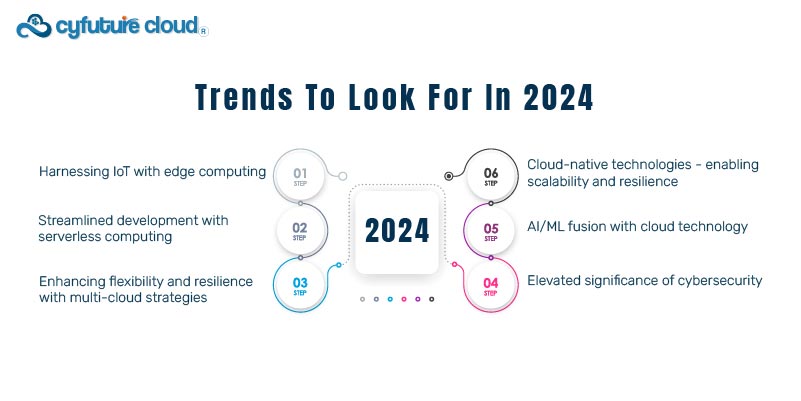Table of Contents
As technology advances, the landscape of cloud hosting, especially for Windows-based systems, experiences continuous transformation. In 2024, shared hosting trends are poised to significantly reshape how businesses utilize these services. The latest hosting trends reveal a shift towards enhanced performance, security, and user experience in Windows cloud hosting.
This year, we can expect Windows cloud hosting providers to drive innovation, offering new opportunities for businesses to optimize their operations.
Let’s explore the 2024 hosting trends set to revolutionize the industry and how these developments will impact Windows cloud server hosting.
1. AI As-A-Service
AI as a service stands out as a revolutionary solution facilitated by cloud infrastructure, democratizing access to artificial intelligence across diverse business sectors, including the realm of windows cloud server hosting. The core concept of AI revolves around training intricate models, exemplified by the large language model (LLM) utilized in applications like ChatGPT, on extensive datasets through substantial computational power.
Nevertheless, the scale and resources demanded for such AI development often exceed the capabilities of individual businesses. Cloud platforms, particularly those offering windows cloud server hosting, bridge this gap by presenting AI as a service. This empowers organizations to leverage advanced AI capabilities without shouldering the heavy burden of extensive infrastructure or computational resources.
Cloud-based AI services, emphasizing windows cloud server hosting, grant organizations unprecedented access to sophisticated AI models and technologies. These services encompass predictive analytics, machine vision, natural language processing, and various other AI capabilities. Businesses can seamlessly integrate pre-trained models, scalable computing resources, and AI capabilities into their workflows without necessitating significant upfront investments in hardware or specialized knowledge, thanks to the adoption of AI as a service via cloud platforms.
This enhanced accessibility democratizes AI, providing empowerment to organizations of diverse sizes and industries, including those employing windows cloud server hosting. It fuels innovation, process optimization, and insights-driven strategic decision-making. The overarching impact of AI as a service on cloud platforms, with specific attention to windows cloud server hosting, transcends technological progress, delivering economic and societal benefits by democratizing the transformative potential of artificial intelligence.
2. Hybrid and Multi Cloud Integration:
The rise in adoption of multi-cloud and hybrid cloud strategies, particularly among large organizations, indicates a strategic shift towards diversifying cloud service providers to meet varied business needs, including windows cloud server hosting. strategies, where companies leverage services from multiple cloud providers, and hybrid cloud approaches, combining on-premises infrastructure with cloud services, offer distinct advantages but come with their set of challenges.
One of the key advantages is the flexibility and choice these strategies offer, especially when considering windows cloud server hosting. Businesses can selectively choose specialized services from different providers, optimizing costs and leveraging specific strengths of each platform. This diversification minimizes vendor lock-in and enhances resilience against potential service outages or disruptions from a single provider. Additionally, hybrid cloud solutions, including windows cloud server hosting, cater to organizations seeking a balance between leveraging cloud benefits and retaining certain data or applications on-premises due to compliance, security, or performance reasons.
However, this diversification introduces complexities in data governance and integration, specifically when dealing with windows cloud server hosting. Managing data across multiple cloud environments requires robust governance frameworks to ensure compliance, data security, and seamless data movement. Integrating these diverse cloud services, including windows cloud server hosting, with legacy systems or on-premises infrastructure often demands sophisticated solutions to bridge different platforms, potentially adding complexity to IT operations.
Overall, while multi-cloud and hybrid cloud strategies offer enhanced flexibility and tailored solutions for businesses, managing the intricacies of data governance and integration, especially in the context of windows cloud server hosting, remains a critical focus for organizations adopting these advanced infrastructure models. Balancing security, flexibility, and operational efficiency becomes imperative in maximizing the benefits of these diverse cloud approaches.
3. Enhanced Security Protocols:
In the evolving landscape of Windows cloud hosting, the emphasis on enhanced security protocols stands out as a critical trend for 2024. This heightened focus stems from the escalating concerns regarding cybersecurity threats that continue to evolve in sophistication and frequency. To counter these challenges, Windows cloud hosting providers are expected to implement more robust encryption measures, ensuring that data remains protected both in transit and at rest. This means employing stronger encryption algorithms and adopting encryption practices that safeguard sensitive Windows-based applications and data from unauthorized access or breaches.
Moreover, advanced threat detection mechanisms will become integral in fortifying Windows cloud environments. Providers are anticipated to invest in cutting-edge threat detection tools powered by machine learning algorithms and AI-driven analytics. These tools will continuously monitor the cloud ecosystem, identifying anomalous activities or potential security breaches in real-time. This proactive approach enables swift response and mitigation strategies to thwart cyber threats before they cause substantial damage.
Compliance adherence is another pivotal aspect within the enhanced security protocols. Windows cloud hosting trends in 2024 will align closely with industry-specific compliance standards and regulations. Providers will prioritize adherence to these standards, ensuring that businesses using their services can maintain compliance with data protection laws, industry regulations, and privacy mandates. This compliance-centric approach instills trust and confidence in businesses, assuring them of a secure environment for their Windows-based applications and sensitive data within the cloud.
Trends To Look For In 2024

4. AI and Automation Integration:
The integration of AI and automation within windows cloud server hosting services stands as a pivotal advancement reshaping how businesses manage their infrastructure. In 2024, this trend is expected to surge as organizations seek more efficient ways to handle their Windows-based environments through windows cloud server hosting. Automation tools, specifically designed for windows cloud server hosting, will revolutionize resource management by automating tasks like provisioning, scaling, and maintenance.
These tools, tailored for windows cloud server hosting, will streamline processes, ensuring optimal resource allocation, thereby enhancing performance and scalability. For instance, automated scaling can dynamically adjust resources in response to changing demands, ensuring that applications running on Windows environments via windows cloud server hosting maintain optimal performance without manual intervention.
Moreover, the fusion of AI-driven insights into windows cloud server hosting will enable predictive analysis and proactive management. By harnessing AI capabilities, these hosting services, specifically for windows cloud server hosting, will leverage data patterns, usage trends, and performance metrics to forecast potential issues before they occur. AI algorithms, integrated into windows cloud server hosting, will analyze historical data to predict usage patterns and identify potential bottlenecks, enabling preemptive actions to avoid downtime or performance degradation. This predictive approach empowers businesses to proactively manage their Windows environments through windows cloud server hosting, enhancing reliability and minimizing disruptions.
Overall, the integration of AI and automation within windows cloud server hosting represents a significant leap towards more intelligent, self-managing systems, fostering efficiency, agility, and reliability in managing Windows-based infrastructure.
5. Performance Optimization for Windows Workloads:
Performance optimization for Windows workloads within cloud hosting environments is crucial due to the specific requirements and intricacies of Windows-based applications. In 2024, the focus on this aspect stems from the need to ensure optimal performance, reliability, and efficiency for running these workloads in the cloud.
Windows-centric applications often demand tailored optimizations to operate seamlessly within a cloud environment. This entails fine-tuning the infrastructure to better align with the specific requirements of Windows workloads. Cloud providers are expected to enhance their infrastructure, ensuring that it’s optimized and well-suited for running Windows-based applications efficiently. This optimization could involve hardware configurations, networking setups, and storage solutions tailored to cater specifically to the demands of Windows workloads.
Moreover, improved compatibility is essential for ensuring that Windows applications run smoothly in the cloud. Cloud hosting trends in 2024 will likely emphasize enhanced compatibility layers or middleware that bridge the gap between the intricate Windows architecture and the cloud infrastructure. This compatibility enhancement aims to mitigate any potential issues that might arise due to differences in environments and ensure seamless operation of Windows-centric applications.
Specialized services dedicated to enhancing performance for Windows workloads are also expected to emerge. These services could include specific tools, frameworks, or optimizations geared towards addressing the unique needs of Windows-based applications. By offering specialized solutions, cloud hosting providers aim to provide a more tailored and efficient environment for businesses relying on Windows-specific workloads, enabling smoother operations and improved overall performance within the cloud ecosystem.
6. Focus on Edge Computing and IoT:
Edge computing and IoT (Internet of Things) continue to expand their footprint. Windows cloud hosting trends will likely feature services catering to edge computing requirements, enabling seamless integration with IoT devices running Windows-based applications. This trend will emphasize low-latency processing and real-time data analysis at the edge.
A cloud-related concept known as “edge computing” processes data as near to the point of collection as feasible. A wearable real-time cardiac monitor that can detect arrhythmias might serve as an example. Since the majority of the data it gathers would be “normal” cardiac beats, it would be a waste of bandwidth to transmit all of the data to the cloud for analysis before returning it to the user to reassure them that everything is OK.
This expense is avoided by analysing the data directly on the device, which also allows for faster user alerts in the event that abnormal data is found. 2024 will see a rise in the amount of applications that can benefit from edge computing due to factors such as enhanced networks like 5G, smaller, more power-efficient CPUs, and more memory-efficient algorithms.
7. Containerization and Kubernetes Support:
In the realm of modern cloud computing, containerization and Kubernetes orchestration have emerged as pivotal technologies driving agility, scalability, and efficiency in application deployment. Containerization, epitomized by tools like Docker, enables packaging applications and their dependencies into lightweight, portable containers.
These containers ensure consistency across many settings, including Windows environments, by encapsulating an application’s code, runtime, libraries, and dependencies. In contrast, Kubernetes acts as an orchestrator, controlling how these containers are deployed, scaled, and run in a clustered environment.
Strong containerization and Kubernetes support are essential features for Windows cloud hosting services, since more and more companies use Windows-based platforms for their applications. In 2024, there’s a palpable surge in demand for better integration and native support for Windows-based containers and Kubernetes clusters. This includes enhancing the compatibility of container runtimes on Windows platforms, refining management tools, and optimizing the orchestration of Windows containers within Kubernetes clusters.
The anticipated advancements in Windows cloud hosting services align with the growing trend of containerization and Kubernetes adoption in Windows environments. This evolution promises more streamlined management and efficient deployment of applications, irrespective of the operating system, allowing businesses to harness the benefits of containerization’s agility and Kubernetes’ orchestration capabilities within the Windows ecosystem.
Ultimately, these advancements are set to empower businesses with improved flexibility, scalability, and ease of management for their Windows-based applications, fostering a more dynamic and responsive IT infrastructure.
Conclusion:
The evolution of Windows cloud server hosting in 2024 is poised to usher in a new era of efficiency, security, and innovation for businesses. By embracing hybrid models, prioritizing security, integrating AI-driven automation, optimizing performance for Windows workloads through windows cloud server hosting, focusing on edge computing, and enhancing support for containerization, businesses leveraging Windows-based systems will unlock new levels of productivity and competitiveness in the digital sphere. As these trends unfold, embracing the evolving landscape of windows cloud server hosting will be imperative for businesses aiming to stay at the forefront of technological advancements.
Recent Post
Send this to a friend

 Server
Colocation
Server
Colocation CDN
Network
CDN
Network Linux
Cloud Hosting
Linux
Cloud Hosting Kubernetes
Kubernetes Pricing
Calculator
Pricing
Calculator
 Power
Power
 Utilities
Utilities VMware
Private Cloud
VMware
Private Cloud VMware
on AWS
VMware
on AWS VMware
on Azure
VMware
on Azure Service
Level Agreement
Service
Level Agreement 




















